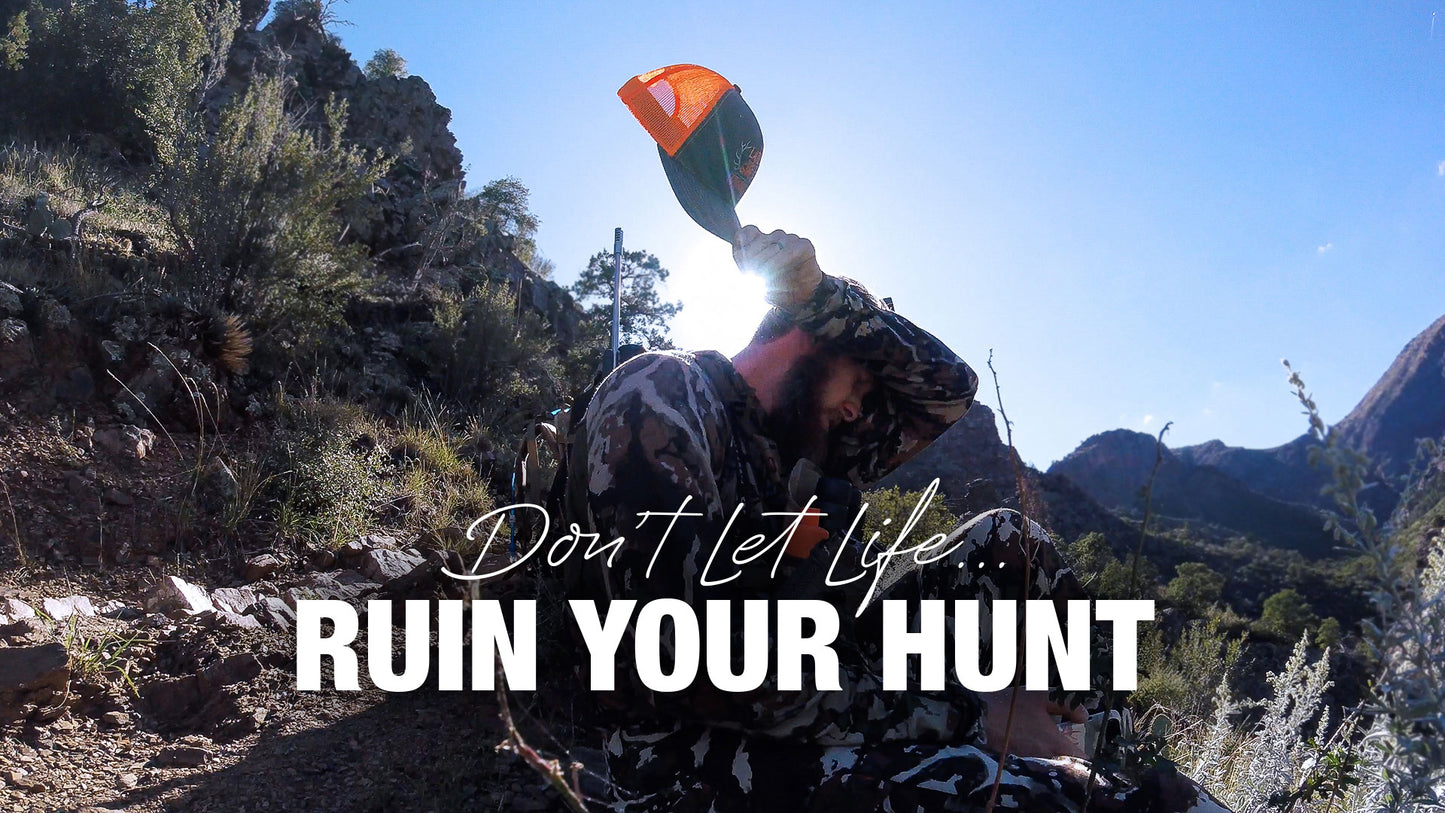
I was two days into an archery elk hunt, and I was toast! Hot, discouraged, and feeling like garbage — I found myself sitting against a tree debating all my life choices. I had drawn this coveted Arizona archery elk tag in a unit that is particularly special to me, and since February I had been making huge plans for the epic two-week hunt, as well as a film that was sure to come out of this adventure.
However, three months before opening day, I made a series of major life decisions. I left my full time job and struck out on my own. I also decided to buy a house that needed significant remodeling before we could move into it (while also needing to be out of the previous house by a certain date for the new owners). By the time September rolled around, I had four major freelance projects that were coming due. Between remodeling the house, getting work done, and remodeling some more, I was working 18 hours every day. As the days of September passed, my planned “two weeks” of elk hunting got whittled down…then whittled some more…until I finally carved out 3.5 days I would be out there with the distant (read “not likely”) possibility that I’d get a few more days after a business trip I had to take in the middle of the season.
And so with this backdrop in mind, you can see why a man might find himself sitting under a tree lacking the will to hike back to the truck, much less keep hunting. My head was anywhere but elk hunting — despite the fact that I had been surrounded by screaming bulls and had multiple encounters each day for the past few days.
It wasn’t an easy decision, but I accepted that I needed to get home, rest, and get caught up on all my impending deadlines. My elk season was officially over. I had let life absolutely crash into this hunt from all sides, and I felt I had no choice but to cut my losses and plan better for the next one.
In retrospect, it seems obvious that I was setting myself up for failure. But, what ended my season wasn’t just a mental or physical crash, or even just taking on too much at one time — it was the failure to look at more than just the hunt itself.
I learned a couple valuable lessons about how to keep life from ruining your hunt. Let me share them with you…

MENTAL RESOURCES ARE A FINITE COMMODITY
For something people do for fun, hunting is incredibly mentally exhausting. The amount of focus, grit, and setbacks that must be overcome to keep yourself going out there will require massive mental resources. So, when you’ve left yourself a huge pile of stress and things that need to get done back at home, that is inevitably going to compromise your available mental fortitude. I knew I had nothing left in the mental tank that day when I spent half an hour circling and not finding a water hole I’d been to 100 times. I just couldn’t get my brain and map to cooperate with each other. (By the way, when I did finally find it, there was already a hunter sitting there.)
All that to say, the mental lesson learned is that you need to have peace of mind that things are taken care of back at home. Depending on the nature of your work, that may mean clients have their deliverables already or you’ve at least clearly communicated when you’ll be back and when you’ll complete the work. It may be simpler than that and you just need to get the time off approved and have a coworker cover a couple things for you in your absence. Either way, make sure you’ve made accommodations that allow you to know the work stuff is (or will be) covered, and you can close that mental box for the duration of the hunt.
Obviously, life is way more than work, so the next question is: are your home and family squared away as well? I have an absolute rockstar of a wife who lets me go on virtually any adventure I want to take, but I’ve found that having something like an inReach has been invaluable for my mental game. Those simple check-ins back at camp to know that she and the kids are doing fine and get a little update on what’s going on helps me stay more focused during the daylight hours rather than worrying what might have happened while I was off the grid.
Also, so many of us squeeze all the vacation time we can for a hunt, so we often work right up to the hunt and clock right back in as soon as we get back. Might I suggest building a little cushion on both sides of the hunt? Even if it’s a fun dinner out the day before you leave and maybe planning your hunt one day shorter so you can take that last day to rest a bit, play with your kids, and just regroup before rejoining the grind. Knowing those things are planned and in place will further help you not have home or family stuff to worry about, which will help maximize your ability to focus on the hunt.

PRE AND POST-HUNT ARE PART OF THE HUNT
When I’m mapping out my hunting plans for the season, I’ve often been guilty of just looking at the hunts themselves and making sure there’s a reasonable amount of cushion between each one to get work done and be an engaged husband and father. But, this has often led me to frantic seasons of cramming in work, rushing off to a hunt, skipping crucial scouting or prep time, and then I do it all over again because the next hunt is fast approaching. After more ill-prepared hunts than I want to admit, I’m finally learning to factor in everything a hunt should entail and try to build enough time to accomplish those things.
Now, some hunts are in familiar spots and you can just grab your gear, get out there, and get on animals. But, plenty of other hunts need a bit more TLC and prep time, and that requires building enough time into your schedule to accomplish those tasks. Whether that’s practice time behind your weapon, scouting a new area so you don’t waste valuable hunting days learning the lay of the land, or even considering people you may be hunting with and ways you may be able to help them prepare. Yes, you need to build time to make sure crucial things like work and family are situated, but the hunt itself may need some pre-effort for you to get the most out of it. And as with virtually any kind of trip, a hunt is so much more enjoyable if you’ve eased into it with plenty of preparation, rather than feeling frantic and overwhelmed right up to the moment you get to the trailhead.
Case in point, I just forced myself to not plan an archery elk hunt this year. I have an archery antelope tag in August that took me 13 years to draw, and then my oldest son finally has a rifle elk tag at the beginning of October. Looking at the calendar, I could easily sneak up to Colorado for a week in September and chase some elk in between those two hunts, but I know that I would end up cheating my antelope hunt, my son’s elk hunt, or maybe both. As much as I love chasing elk with my bow, I’d much rather spend extra time at the range getting my son more confident behind his rifle, making him a part of the scouting efforts (even though it’s an area I know well), and generally avoiding that typical frantic rush from one hunt to the next.

WHATEVER YOU DO…
I realize these are nuanced internal conflicts the average hunter will have to contend with. And as simple or obvious as these lessons may seem, most hunters I know have a tendency to neglect them because our default mindset is “get as many days in the field as I possibly can.” That’s a fine goal, but sometimes we cheat ourselves and reduce the quality of our hunting days in the name of quantity. A slightly more intentional approach to our hunt planning and building life around those high-priority hunts will lead to much more enjoyable and successful seasons.
And as applicable as I tried to make those lessons for a wide audience at different stages of life, work, and family, let me give you one final piece of advice that I believe applies to every hunter in America. Whatever you do — no matter how great the deal seems — don’t buy a fixer-upper house and agree to move in September. It’s guaranteed to mess up your elk season!
Eric Voris is a passionate adult-onset hunter, the author of How to Hunt: A Total Beginner's Guide to Hunting Big Game, and the creator behind Late to the Game Outdoors. He is an accomplished writer, filmmaker, and content creator in the outdoors space, and spends his time chasing animals across the West. Eric lives in Arizona with his wife and three kids, dodging rattlesnakes and hunting together whenever possible.
